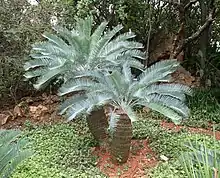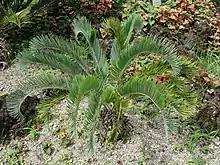Encephalartos laevifolius
Encephalartos laevifolius is a species of cycad that is found in KwaZulu-Natal, Limpopo Province, and Mpumalanga provinces of South Africa.[1] The species is facing extinction in the wild, but is widely cultivated.
| Kaapsehoop cycad | |
|---|---|
 | |
| Specimens in the Pretoria National Botanical Garden | |
| Scientific classification | |
| Kingdom: | Plantae |
| Clade: | Tracheophytes |
| Division: | Cycadophyta |
| Class: | Cycadopsida |
| Order: | Cycadales |
| Family: | Zamiaceae |
| Genus: | Encephalartos |
| Species: | E. laevifolius |
| Binomial name | |
| Encephalartos laevifolius Stapf & Burtt Davy | |
Description

It is a cycad with an arborescent habit, with an erect stem, up to 3.5 m tall and with a diameter of 25–35 cm, sometimes with secondary stems originating from basal suckers. The leaves, pinnate, are up to 1 m long, supported by a petiole 22–25 cm long, and composed of numerous pairs of lanceolate, coriaceous leaflets, 12–15 cm long, with entire margins and pungent apex. It is a dioecious species, with male specimens that have 1 to 5 cylindrical-fusiform cones, 30–40 cm long and 9–10 cm broad, yellow to brown in color, and female specimens with 1-5 cylindrical cones, 20 long –30 cm and width 10–15 cm, light yellow. The seeds are roughly ovoid, 2.5-3.5 cm long, covered with a yellow-orange flesh.[2]
References
- "Encephalartos laevifolius in Tropicos".
- "Encephalartos laevifolius". PlantNET Home Page - National Herbarium of New South Wales. Retrieved 2019-09-17.
External links
 Media related to Encephalartos laevifolius at Wikimedia Commons
Media related to Encephalartos laevifolius at Wikimedia Commons Data related to Encephalartos laevifolius at Wikispecies
Data related to Encephalartos laevifolius at Wikispecies
